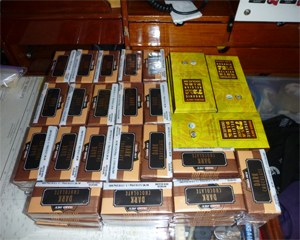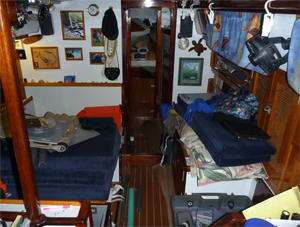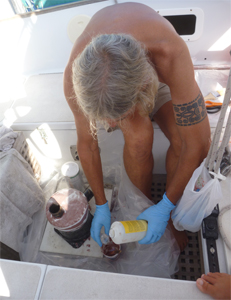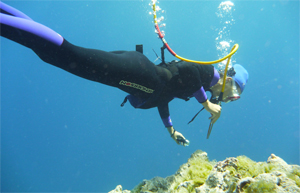Apparently Jim Lovell and Frank Borman had just a horrible time floating around the Earth for 14 days in 1965 on the Gemini VII mission. The food was bad, they couldn’t change clothes and the toilet situation was unspeakable. While reading about this recently in Mary Roach’s hilarious book, Packing For Mars, I wondered how much pain our astronauts could have been saved if NASA had asked cruising sailors for advice.
Voyagers, after all, have been spending long periods in cramped quarters and potentially high-risk situations for centuries, and we’ve gotten pretty good at it. My captain, Paul, started to dream about cruising when he read books by Eric and Susan Hiscock published starting in the 1950s, and they had clearly already learned some of the lessons that Lovell and Borman helped NASA realize through so much stink and suffering a decade later. As multiple governments and companies point the human race toward Mars and other distant destinations, I think it’s time to remind everyone about some of the knowledge cruising sailors can offer to modern long-distance travel through any type of space.
 |
|
Storage space is always at a premium aboard a voyaging yacht. |
Food is really important
After decades of food in squeeze tubes, dehydrated cubes and other terrifying ideas, NASA has finally started to realize that humans have a complicated and important relationship with our food. Food is health and safety, and good food is wealth and comfort. Comfort foods remind us of the love of family, which is important when we’re feeling lonely and far from our network of people. Astronaut ice cream may have seemed entertaining when I was a kid, but in the middle of the ocean I crave the quesadillas my dad made on Saturday afternoons, or my sister’s tortellini soup. Luckily most comfort foods aren’t very hard to make at sea. In fact, they seem almost tailored to the one-pot cooking we favor when bouncy conditions require a galley seatbelt and firm metal potholders on the stove.
We stock plenty of rice, beans and pasta in the easy-grab area around the stove. We also use a lot of our small refrigerator space for cheese, which is a serious comfort to me even when dosed out carefully in small amounts throughout the season. Captain Paul built a drawer space to hold a fairly complete spice cabinet — a pinch of chipotle or cardamom in a dish is what makes it taste just like grandma’s. We curate these spaces carefully, as our tastes and cravings change with the years but the cubic inches never do.
While gravity surely simplifies our cooking procedures compared to those of astronauts, we struggle with limited fuel storage just like a space capsule. For this reason, we consider our pressure cooker to be a vital piece of equipment on our boat. Large enough for big chunks of meat, our six-quart pressure cooker gets the job done twice as fast with half the gas while preserving the liquid content of the meal. Our pot has a pop-up pressure gauge and a thumb lever to release, which I find less intimidating than the jiggle-top ones. We stock extra seals for our model, since the seal makes or breaks the whole concept.
 |
|
Like a space capsule, all the gear must fit inside a sailing vessel. |
May explode under pressure
Anyone who has been on a road trip, let alone a sailboat, could have told NASA that personality issues could become paramount on long missions. Being effectively trapped in a small space together can definitely exacerbate what had been only small personality differences ashore. One cruising friend had me rolling on the floor with each email that detailed all the ways a temporary crewmember got under her skin: He had claimed to be an experienced sailor but then did obviously wrong things with the sails; he ignored her instructions on her boat; he wanted to chat while she wanted to read; he ate in a really weird way. Clearly even the calmest people get nitpicky under stressful conditions, so the most successful cruisers are especially sensitive toward other peoples’ personal space and private belongings. Remember your college roommate who would borrow your jacket and finish the cereal without buying more? Don’t take him cruising, and don’t be him either.
Many crews struggle with arguments about how to best manage the boat in challenging conditions. This makes sense because the handling of the vessel touches our personal safety, so we are trying to make ourselves trust the other members of the crew with our lives. While it would have been easy for Paul to inform me that his years of experience and ownership of the boat trump mine, he has instead been open to discussing decisions to make sure we are in agreement. His rule is that if we disagree then we always decide on the more conservative approach, no matter whose idea it is. This keeps us both focused on the safety of our floating home, which builds trust between us. We think trust in each other is absolutely critical to being able to enjoy our lifestyle or even sleep at night. Anything that could hurt that trust (“I’ll just go on deck without my harness for a minute and he’ll never notice”) risks our whole voyaging “mission,” which is to have fun together.
Sleep soundly
Apparently some of the most explosive crew situations on space missions have boiled over because astronauts are typically scheduled a bare minimum of sleep in their very busy days. Everyone gets cranky when sleep deprived, so we make sleep a priority on our boat. Since it can be difficult to sleep soundly in rough conditions, we assume that each sailor needs plenty of time to try to drop off. We find that we sleep about 10 hours a day if we can, and in bouncy conditions we may spend even more time in the bunk just because it’s the most comfortable place to hang out or read. This isn’t laziness — the primary job while off watch is to get rested to be mentally alert for your next watch. Do whatever you need to do, but get rest. We schedule sail changes and anything else that makes noise around the watch schedule to avoid waking anyone unnecessarily. When it is time to wake someone for their watch, we are pointedly gentle and sweet, and allow them time to become alert before trying to give information. This may seem obvious now, but when you really just want to collapse into your bunk it helps to have an agreed-upon procedure to keep interactions pleasant and reasonably timed.
 |
|
Self-sufficiency is a requirement of voyagers and astronauts. |
We know some cruisers who are successful with a loose watch schedule that relies on crewmembers simply waking each other when they are tired. We prefer a set schedule so our body rhythms can adapt to the schedule while on long passages, and so there is no question that we are each carrying our weight. We use set procedures like the watch schedule to reduce building resentment or taking things personally. Our 5-4-3 schedule starts at 7 a.m., with the long watches in the day when it’s easiest to stay awake. I used to think it was my older sister’s fault that I hate the creepy dark time in the wee hours of the morning, but now I know that most humans don’t like it. We do our shortest watches during those creepy hours, and no monsters have jumped out at me yet. We have heard of cruising boats that rely on their AIS transponder rather than keeping a 24-hour watch, but that strategy would not work for our peace of mind. It is an unusual night when we don’t shorten some sail for a passing squall, so I would just lie awake waiting for that squall anyway.
The stinky stuff
Apparently it has taken NASA many years of studies to decide that a buildup of sweat, oils and dead skin cells makes for a gross environment and reduces crew morale. Well, I guess we should be happy they finally figured it out. Cruising sailors could have told them that humans need to bathe regularly, preferably daily. In fact, we put a fair amount of effort into keeping salt either outside the boat or inside our skin. Salt attracts moisture, so any salty fabrics will mildew fairly quickly. One does occasionally meet an old-school sailor who showers in salt water, but I would note they are usually singlehanders. I remember meeting one while cruising Mexico — I could smell his boat from 20 feet off the beam as I paddled past in my kayak.
In addition to a daily shower, we use a squirt bottle to give salty feet and hands a quick rinse just outside the companionway. We also keep a washcloth easily accessible for each person to sponge off salt spray or sweat at the end of their watch, before it has a chance to get on the upholstery or sheets. When crossing the equator, that sponge-off feels awesome.
We keep biodegradable wet wipes in the bathroom to keep butts as clean as possible. NASA’s extensive studies discovered that an unwashed person’s fecal bacteria travel all over the body in just a day or two, and space station astronauts are now using wet wipes regularly in space as well. This strategy is particularly important to tropical sailors, where clothes don’t always mediate between skin and the watch seat.
 |
|
For voyagers, a “space walk” still involves bringing your own oxygen. |
Schedule in normality
Many non-cruisers seem surprised that I can find ways to fill my time offshore. Indeed, from the maelstrom of my busy working life I worried that cruising would be boring and unfulfilling. I have found that cruising allows us to move at the speed humans are designed for, which is actually much more fulfilling. We’ve found that work we do while out cruising tends to be of a higher quality than work we did while in port in our scant hours around paying jobs. We slow down to the speed of the materials and are less likely to do a sloppy job or break things in our rush.
The regular boat chores and sail management take up about a third of our waking hours (assuming we haven’t been breaking things), and we plan ahead for activities to occupy us if conditions allow. We have built an extensive electronic library, and we fill our readers with a broad selection before casting off lines. I have become a much better correspondent as a sailor, able to spend a whole night watch crafting thoughtful and hopefully entertaining responses to emails. Paul constantly thinks of ways to make the boat work better or be more comfortable for us. His quiet watches are spent on a drafting program designing something, or using the astronomy program to actively watch the gorgeous night sky. We both study languages using a computer program so we can arrive in a new port with some familiarity. Basically, any time the boat leaves us is spent learning about or creating things that really interest us. Far from being bored, I approach the end of a long passage with some sense of a vacation ending as I have to rejoin the demands of society.
The more I read about the growing enthusiasm for the race to Mars, the more I think voyaging sailors might make the ideal astronauts. We’re used to spending a long time in a small space with just one or two other people, and we even like it most of the time. We’re accustomed to the combination of boredom and adrenaline that is normal for tiny humans traveling through big huge nature. The famous science fiction writer Isaac Asimov imagined that humans born in outposts on Mars might be more psychologically fit for lengthy space travel than their genetic equals on Earth. I suggest that of all the humans on Earth, cruising sailors are the most predisposed to a lifestyle of space voyaging. The important question is: Will there be good snorkeling on Mars?
Bonnie Wagner voyages aboard the Ohlson 38 Romany Star with her husband, Paul.

